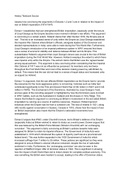Essay
A*- A History A Level Source Question British Empire 1J
- Course
- Institution
- Book
Essay study book Oxford AQA History for A Level: The British Empire c Student Book Second Edition of Sally Waller, Anthony Webster, Robert J Carsson, Tom Allen - ISBN: 9781382023184 (Source question)
[Show more]



